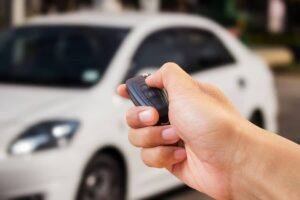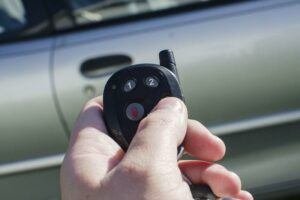A damaged car alarm leaves your vehicle insecure, and vulnerable to thieves. The primary purpose of installing an alarm is to prevent theft and car vandalism. But once damaged, the car would exhibit symptoms such as continuous beeping, car not starting, and a lot more. Why is my car alarm not working? Keep reading to find out.
Car alarm might stop working due to depleted car and remote battery, improper installation, faulty battery terminal, damaged key fob and sensors, dirty hood latch, and outdated car alarm. A regular inspection of your car alarm would help to resolve these problems before they occur.
Before you commence repairs, make sure you’re certain of the problem. Except you’re willing to replace a good alarm early, we recommend using a code reader to pinpoint the precise issue.
Reasons Why Car Alarm Is Not Working
- Low Battery Charge
The car battery is responsible for powering the car alarm. It is also responsible for igniting the vehicle and other electronic devices in the vehicle. The car alarm would stop working once the battery is depleted or near-depleted. This is because the car reserves battery to start, therefore, cutting all other supplies in the vehicle.
A low car battery might also cause the alarm to go off without cause. This is common wiry advanced alarm systems. So, be sure to first check the battery whenever your alarm malfunctions.
The recommended battery for any vehicle is 12 volts. Anything less may cause problems.
- Faulty Battery Terminal
Asides from the depleted battery, a faulty battery terminal may also cause the alarm to malfunction. The terminal can be located on top of the battery. Check the positive and negative terminals for dirt as this may reduce the electrical power going into the devices in your vehicle.
Clean the terminals with a microfiber cloth. Before doing this, remove the negative terminal to avoid electrical problems such as short circuits and shocks. If the terminals are always dirty, then you may have to replace them with a compatible terminal.
Since the car battery is an important component of your car, we recommend hiring a professional if you’re not familiar with the technicalities.
- Improper Installation
Most car alarm problems can be linked back to improper installation. While there is an installation guide, most drivers still make mistakes, especially when it’s their first time. Nonetheless, we recommend following the guidelines to the latter.
Check the mounting area, wiring, and connections. Make sure they are tight and in the right condition.
Improper installation is usually a problem with newly installed alarms.
If you were responsible for installation, then hire a professional to check the installation.
- Damaged Key Fob
The key fob is the device you use for sending commands to the control unit installed inside the vehicle. There are different types of fobs: one-way and two-way pagers.
They have similar working principles but the two-way pager receives and sends data. Because it is small, they are easily damaged, especially when left in your back pocket. Once damaged, the alarm system stops working as you can no longer send commands to the alarm system.
A damaged key fob may also result in false alarms and commands.
- Damaged Sensors
Alarm systems are equipped with sensors to notify drivers of intruders. They work by collecting data and sending it to the alarm control unit. This ends with a loud alarm from the horn installed under the car’s hood.
Car alarm sensors include shock, tilt, door, and proximity sensors. Once any of these sensors get damaged, the performance level of the car alarm reduces. It may also cause the alarm to go off randomly.
Solutions
If you’re experiencing any of the above-mentioned problems, then you need to find a solution fast. While each of the problems stated above is supported with a brief solution, the following solutions are more detailed. Caution: do not attempt implementing solutions above your technical know-how as it could cause damage to your car and its components.
- Inspect the Battery
Before you install a car alarm, check the capacity of the car battery. If it’s below 12 volts, then you may want to consider upgrading to the battery before adding your alarm. Make sure the alarm is strong enough to power all the electronic devices in your vehicle to avoid abrupt damage.
If the alarm stops working after you’ve upgraded the battery, then check the charge to see if it’s low and recharge it. If that’s not the case, check the battery connectors to see that everything is properly connected.
Once recharged and properly connected, the car alarm system should come back online. If it doesn’t, then proceed to the following solutions.
- Evaluate the Key fob
Repair or replace the key fob if damaged. Most advanced alarm systems come with dual fobs, so check your kit for replacement. If there is no replacement, contact the manufacturer for one. This may cost you, especially when your warranty is expired.
An alarm system may also stop working if the built-in chip fails to send a readable code to the control unit.
- Use a Code Reader
A car code reader is a simple device that pinpoints the exact problem affecting your vehicle with an accurate diagnosis. By using a code reader, you can concentrate on the right problems.
- Reset the Alarm System
Resetting the alarm sets it back to its default settings, meaning your alarm becomes new. If the problem is internal, then a reset should make the alarm work again. Resetting an alarm is simple and can be done without additional tools. You also don’t need technical know-how to reset an alarm system.
If you’re already inside the car, insert the key into the ignition and turn it to the right. Leave it in that position for another 10 minutes.
However, if you’re locked outside the car and it is not recognizing your fob, you will have to bypass the system by inserting the key into the keyhole in the driver’s door. This signifies to the car that you’re the owner and unlocks the door. Once inside, you’ll need to check for the problem wrong with the alarm.
- Reset the Car Computer
Our final solution for solving a car alarm system that wouldn’t work is to reset the computer. This process is straightforward. Start by removing the positive terminal on the battery, leave it disconnected for about 2 minutes before reconnection. Note that this leaves your car immobile in this state. Also, you can’t use the other electronic devices in your car.
Consult a professional
While car alarms are simple electronic devices, they can pose major difficulties when it is time to diagnose problems. This has caused many drivers to spend unnecessarily on their alarm systems without any notable solution. To avoid such, consult a professional.
This will help you pinpoint the exact problem with your alarm. But make sure the professional is experienced and has good recommendations. Read reviews online before the consultation.
If you’re still covered under warranty, then contact the manufacturer to enjoy free or subsidized repairs. If your warranty also covers replacement, then you’re in luck. However, trying to fix it yourself may void your warranty. So be sure to contact the manufacturer before anything else.
Conclusively, if your alarm isn’t working, start by inspecting the alarm and key fob. If you find any problem here, then schedule a repair or order a replacement. There are several upgraded alarm systems available for sale for you to choose from.
But before upgrading, check the car battery. If it’s low, recharge it or upgrade the car battery itself. Other causes include faulty battery terminals, damaged sensors, and improper installation. Check the wires and connections for any sort of damage. Consult your installation guide to properly place your wires and connectors. For 100% certainty, consider hiring a professional.



